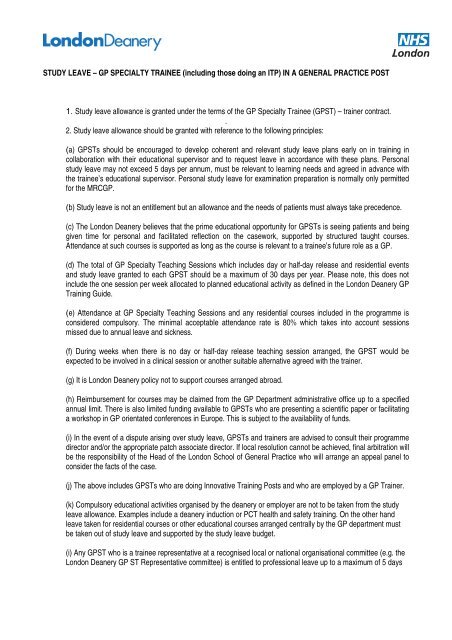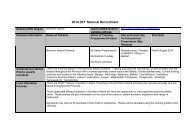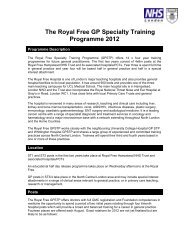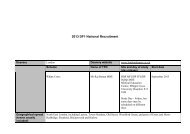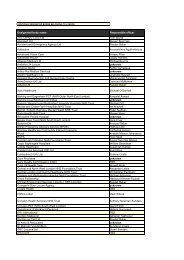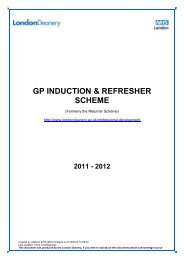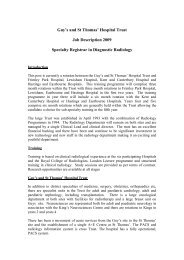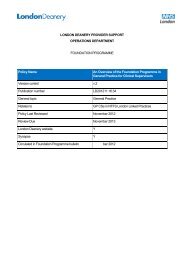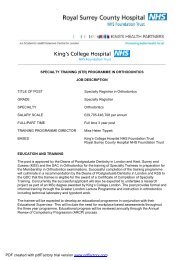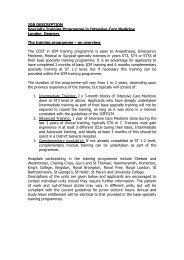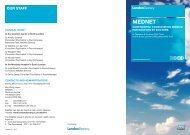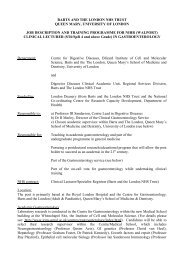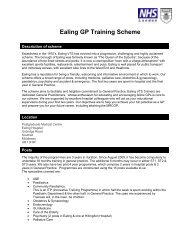STUDY LEAVE GP SPECIALITY TRAINEE - London Deanery
STUDY LEAVE GP SPECIALITY TRAINEE - London Deanery
STUDY LEAVE GP SPECIALITY TRAINEE - London Deanery
Create successful ePaper yourself
Turn your PDF publications into a flip-book with our unique Google optimized e-Paper software.
<strong>STUDY</strong> <strong>LEAVE</strong> – <strong>GP</strong> SPECIALTY <strong>TRAINEE</strong> (including those doing an ITP) IN A GENERAL PRACTICE POST<br />
1. Study leave allowance is granted under the terms of the <strong>GP</strong> Specialty Trainee (<strong>GP</strong>ST) – trainer contract.<br />
.<br />
2. Study leave allowance should be granted with reference to the following principles:<br />
(a) <strong>GP</strong>STs should be encouraged to develop coherent and relevant study leave plans early on in training in<br />
collaboration with their educational supervisor and to request leave in accordance with these plans. Personal<br />
study leave may not exceed 5 days per annum, must be relevant to learning needs and agreed in advance with<br />
the trainee’s educational supervisor. Personal study leave for examination preparation is normally only permitted<br />
for the MRC<strong>GP</strong>.<br />
(b) Study leave is not an entitlement but an allowance and the needs of patients must always take precedence.<br />
(c) The <strong>London</strong> <strong>Deanery</strong> believes that the prime educational opportunity for <strong>GP</strong>STs is seeing patients and being<br />
given time for personal and facilitated reflection on the casework, supported by structured taught courses.<br />
Attendance at such courses is supported as long as the course is relevant to a trainee’s future role as a <strong>GP</strong>.<br />
(d) The total of <strong>GP</strong> Specialty Teaching Sessions which includes day or half-day release and residential events<br />
and study leave granted to each <strong>GP</strong>ST should be a maximum of 30 days per year. Please note, this does not<br />
include the one session per week allocated to planned educational activity as defined in the <strong>London</strong> <strong>Deanery</strong> <strong>GP</strong><br />
Training Guide.<br />
(e) Attendance at <strong>GP</strong> Specialty Teaching Sessions and any residential courses included in the programme is<br />
considered compulsory. The minimal acceptable attendance rate is 80% which takes into account sessions<br />
missed due to annual leave and sickness.<br />
(f) During weeks when there is no day or half-day release teaching session arranged, the <strong>GP</strong>ST would be<br />
expected to be involved in a clinical session or another suitable alternative agreed with the trainer.<br />
(g) It is <strong>London</strong> <strong>Deanery</strong> policy not to support courses arranged abroad.<br />
(h) Reimbursement for courses may be claimed from the <strong>GP</strong> Department administrative office up to a specified<br />
annual limit. There is also limited funding available to <strong>GP</strong>STs who are presenting a scientific paper or facilitating<br />
a workshop in <strong>GP</strong> orientated conferences in Europe. This is subject to the availability of funds.<br />
(i) In the event of a dispute arising over study leave, <strong>GP</strong>STs and trainers are advised to consult their programme<br />
director and/or the appropriate patch associate director. If local resolution cannot be achieved, final arbitration will<br />
be the responsibility of the Head of the <strong>London</strong> School of General Practice who will arrange an appeal panel to<br />
consider the facts of the case.<br />
(j) The above includes <strong>GP</strong>STs who are doing Innovative Training Posts and who are employed by a <strong>GP</strong> Trainer.<br />
(k) Compulsory educational activities organised by the deanery or employer are not to be taken from the study<br />
leave allowance. Examples include a deanery induction or PCT health and safety training. On the other hand<br />
leave taken for residential courses or other educational courses arranged centrally by the <strong>GP</strong> department must<br />
be taken out of study leave and supported by the study leave budget.<br />
(i) Any <strong>GP</strong>ST who is a trainee representative at a recognised local or national organisational committee (e.g. the<br />
<strong>London</strong> <strong>Deanery</strong> <strong>GP</strong> ST Representative committee) is entitled to professional leave up to a maximum of 5 days
per annum. This is separate to annual and study leave. Any queries or concerns about this should be relayed to<br />
the Specialty Training Development Associate Director.<br />
(m) Leave approved for sitting the MRC<strong>GP</strong> is normally granted in addition to the appropriate study leave<br />
entitlement.<br />
<strong>STUDY</strong> <strong>LEAVE</strong> FOR GENERAL PRACTICE SPECIALTY <strong>TRAINEE</strong>S (ST1/2) IN HOSPITAL POSTS<br />
1. Study leave for ST1 and ST2 is normally permitted up to a maximum of 30 days per year (15 days per six<br />
months).<br />
2. This will be reflected in the educational contract that the <strong>GP</strong>ST holds with their employer, the Acute Trust or<br />
other.<br />
3. Study leave is not an entitlement but an allowance and the needs of the patients must always take precedence.<br />
4. The <strong>GP</strong>ST should plan study leave at the beginning of each post in collaboration with his/her educational<br />
supervisor and apply for study leave from the clinical tutor who holds the study leave budget for all trainees<br />
employed by the acute trust. The study for which leave is taken should be considered in the context of the<br />
entire <strong>GP</strong> training programme and not necessarily restricted to the specialty in which it is taken.<br />
Normally, personal study leave may not exceed 5 days, must be relevant to learning needs and must be agreed<br />
in advance with the trainee’s educational supervisor. This must be in line with the employing trust’s study leave<br />
policy.<br />
5. It is <strong>London</strong> <strong>Deanery</strong> policy not to support courses held abroad.<br />
6. Leave approved for sitting the MRC<strong>GP</strong> is normally granted in addition to the appropriate study leave entitlement.<br />
7. In addition to study leave, trainees are normally entitled to 3 hours interruption-free, trust-based, in-service<br />
training per week, although this is exceeded in many departments.<br />
8. Specialty trainees in General Practice are expected to attend <strong>GP</strong> Specialty Training Sessions as part of their<br />
working week.<br />
9. Specialty trainees in General Practice are encouraged to attend both the half day release course and<br />
departmental training, although this is subject to local negotiation.<br />
10. In situations where <strong>GP</strong>STs are enabled to attend both teaching sessions related to their hospital post and to<br />
teaching sessions related to General Practice, then they are expected to apply for and use study leave to attend<br />
the latter.<br />
11. Attendance at <strong>GP</strong> Specialty Teaching Sessions and any residential courses included in the programme is<br />
considered compulsory. The minimal acceptable attendance rate should normally be 80% which should take<br />
into account sessions missed due to annual leave, sickness and rota requirements.<br />
12. <strong>GP</strong> specialty trainees in a public health post must first negotiate time off with their Public Health Clinical<br />
Supervisor and then seek educational approval from (the Head or Deputy Head of School. If approved then<br />
the trainee should submit their study leave expenses to the PCT who will claim reimbursement from the<br />
Director of Finance in the <strong>London</strong> <strong>Deanery</strong>. These trainees will be entitled to a budget of up to £800 pro-rota<br />
which will come from the Public Health Study Leave budget.
13. Compulsory training which is essential to the performance of your job, whether organized by the deanery or<br />
your employer, should not be taken from the study leave allowance. Examples include a deanery induction or<br />
PCT health and safety training. On the other hand leave taken for residential courses or other educational<br />
courses arranged centrally by the <strong>GP</strong> department must be taken out of study leave and supported by the study<br />
leave budget.<br />
14. For local information regarding forms and permission relating to study leave, please consult the relevant<br />
postgraduate medical department administrator or trust HR department.<br />
Last Reviewed SEPTEMBER 2012 Sanjiv Ahluwalia


